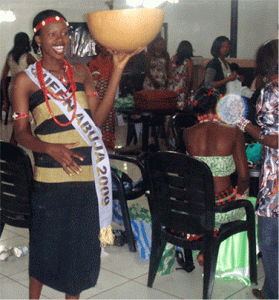2017, Winter: CSWS Research Matters
“Beauty Diplomacy: Culture, Markets, and Politics in the Nigerian Beauty Pageant Industry,” by Oluwakemi M. “Kemi” Balogun, Assistant Professor, University of Oregon, Departments of Women’s and Gender Studies and Sociology
Kemi Balogun writes about her book project, in which she compares the production, symbolism, and political controversies surrounding four pageants to show the way they differently represent the Nigerian nation. In this paper, she highlights two of the national pageants—Queen Nigeria and the Most Beautiful Girl in Nigeria—demonstrating that they exhibit distinct but complementary visions of ideal Nigerian womanhood. Professor Balogun received a CSWS Faculty Research Grant in 2016-17 to support this research. She also received a 2016 Career Enhancement Fellowship for Junior Faculty from the Woodrow Wilson National Fellowship Foundation to support her research and writing for this book project.
From the article:

Winter 2017 Research Matters: A Queen Nigeria contestant, who exemplifies the “girl next door” vibe characteristic of this pageant / photo by Kemi Balogun.
“During the course of fieldwork in Nigeria, I encountered nearly daily coverage of beauty pageants in newspapers, social media, and advertisements, with these contests being used to promote everything from beauty products to specific corporations. There are over 1,000 beauty pageants in the country, according to the Association of Beauty Pageants and Fashion Exhibition Organizations of Nigeria, a regulatory board formed to monitor these events. Not only are the pageants big business in Nigeria, they also are intimately tied to the shifting cultural politics of the country. As one pageant organizer emphatically stated, ‘Now the world is looking for natural beauty and guess what the future is? Africa! African beauty is becoming exciting. All of a sudden we are becoming the future.’ Given that Nigeria has the fastest growing economy in Africa, the pageant organizer echoes the sentiments of many Nigerians that the country remains the inevitable leader to ensure a vibrant future for the region. His enthusiastic statement signals optimism around Nigeria’s promise, a promise emerging through changing aesthetics that recognize the nation as an international trendsetter.
“However, this hopefulness exists against an uneasy backdrop in which repair work must be done to redeem Nigeria’s poor international repute.” For the complete article, go to: 2017, Winter: CSWS Research Matters

